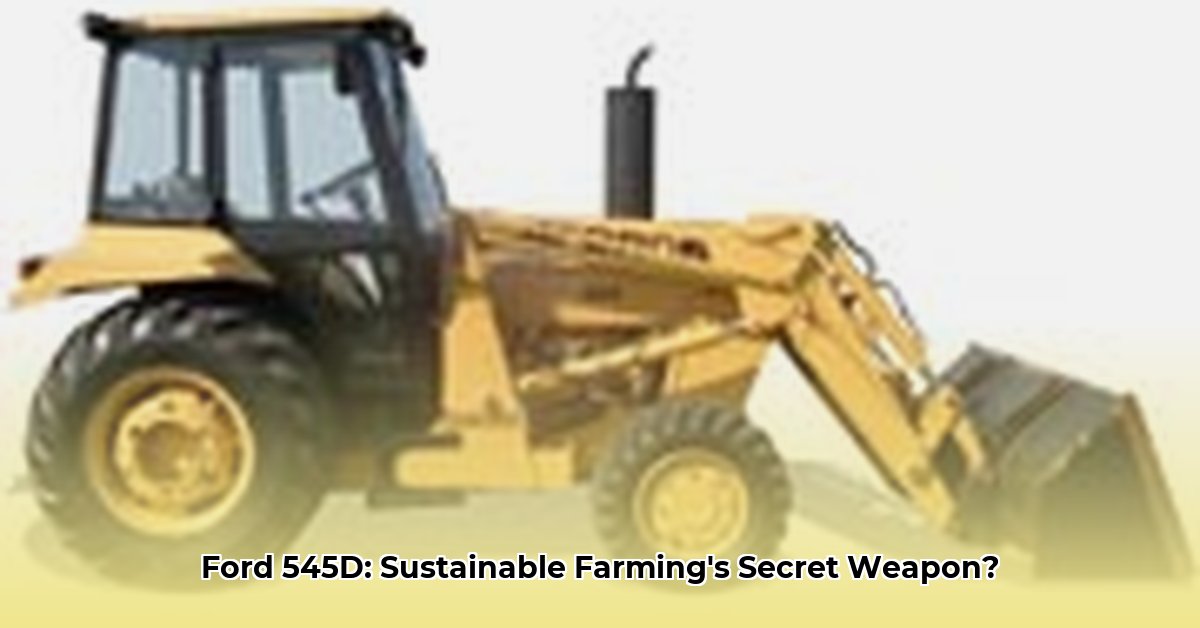
The Unsung Hero of the Fields: A 545D Ford Tractor Story
The sun bleeds crimson across the Iowa horizon, painting the dew-kissed fields in fiery hues. A familiar rumble, low and resonant, breaks the quiet – the deepthroated cough of Old Bess, a well-worn Ford 545D tractor, sputtering to life. For Farmer McGregor, Bess isn't just machinery; she's a partner, a testament to a bygone era of resourcefulness and a surprising champion of modern sustainable agriculture. In a world obsessed with gleaming new technology, Bess represents a compelling counterpoint: a story of resilience, repair, and surprisingly effective sustainability. But is she a viable option in today's farming landscape? That's the question we'll explore.
More Than Just Horsepower: The Economics of Longevity
Bess, let's be frank, isn't renowned for fuel efficiency. This old girl guzzles diesel with the thirst of a desert nomad. But here’s the crucial point: the exorbitant cost of a brand-new tractor presents a significant barrier to entry for many, particularly smaller farms struggling with tight margins. Bess, acquired at a fraction of the price, stands as a compelling example of how prioritizing durable, repairable equipment contributes significantly to sustainable farming practices. Maintaining her isn't just about keeping her running; it's about cultivating a valuable, nearly lost skill—a testament to self-sufficiency. Isn't this intrinsic to a truly sustainable operation?
Beyond the Fuel Gauge: The Broader Context of Sustainability
Let’s move beyond the immediate metrics of fuel consumption per acre and examine the complete lifecycle of a tractor. Manufacturing a new machine is an energy-intensive process, consuming vast resources. Bess's longevity dramatically diminishes her overall environmental footprint. Furthermore, Farmer McGregor’s ability to personally repair Bess minimizes waste sent to landfills—a critical factor too often overlooked in discussions of environmentally responsible farming. Isn’t this a powerful argument for considering the true cost of new technology?
The Art of Repair: A Dying Skill, Reborn
A well-maintained 545D can serve for decades. But this longevity depends on skill, knowledge, and plenty of elbow grease—qualities increasingly rare in modern agriculture. Farmer McGregor, intimately familiar with Bess's every groan and whir, embodies this dwindling expertise. He anticipates her needs, interpreting the subtle shifts in her engine's hum to preempt potential problems. This hands-on experience—the ability to diagnose and remedy issues independently—is invaluable, fostering farm resilience and reducing reliance on outside mechanics. This independent spirit isn’t just economically advantageous; it is a cornerstone of sustainable practice.
The Right Tool for the Right Job: Bess’s Limitations and Strengths
However, let's acknowledge Bess's limitations. Her horsepower, comparatively modest, restricts her capabilities. She falters with expansive fields or heavy-duty tasks. Yet, for smaller farms or specific applications, she's perfectly adequate—a reliable partner that delivers without bankrupting the farmer or the planet. Selecting the appropriate equipment necessitates a careful balance between needs and resources; sometimes, an older, less powerful tractor is the wisest, most sustainable choice. How do we balance efficiency with lasting impact?
Rethinking the Future of Farming: A Sustainable Legacy
The discourse surrounding sustainable agriculture shouldn't solely focus on the latest technological marvels. It requires a holistic perspective. Bess’s story urges us to reconsider our priorities—to value resilience, repair skills, and the long-term advantages of well-constructed, dependable machinery. This isn't just about a single tractor; it's about a paradigm shift in the way we approach sustainability in farming. What does a truly sustainable future look like?
Comparing the Old and the New: A Concise Overview
| Feature | 545D Ford Tractor | Modern Tractor |
|---|---|---|
| Upfront Cost | Significantly Lower | Significantly Higher |
| Fuel Economy | Lower | Generally Higher |
| Repair Costs | Potentially Lower (depending on skill) | Potentially Higher |
| Lifespan | Potentially Much Longer | Typically Shorter |
| Environmental Impact (Manufacturing) | Lower (due to extended use) | Higher (due to manufacturing processes) |
| Horsepower | Lower | Significantly Higher |
This table offers a simplified comparison. Actual costs and lifespans vary significantly based on many factors. The 545D's advantages are most apparent when considering long-term implications. Although fuel efficiency is important, overall environmental impact and economic viability are also critical. The optimal choice depends on individual farm needs and resources.
How to Reduce Emissions from Older Farm Tractors Like the Ford 545D
The Ford 545D's legacy is undeniable. However, its older engine, lacking modern emission control systems, presents a challenge to modern sustainability goals. This isn't just about regulatory compliance; it's about responsible land stewardship. How can we minimize the environmental impact of these reliable workhorses?
Optimizing Operations for Emission Reduction:
- Prioritize Maintenance: Regular tune-ups, clean air filters, and proper engine adjustments significantly improve fuel efficiency and reduce emissions.
- Efficient Driving Practices: Avoid idling, accelerate and decelerate smoothly, and match the tractor's power to the task to minimize fuel consumption.
- Tire Pressure Management: Maintaining proper tire inflation reduces rolling resistance and improves fuel economy.
- Explore Alternative Fuels: Biodiesel, derived from renewable sources, is a potential cleaner fuel alternative for compatible older engines. Always consult with an expert before making a switch.
Key Takeaways:
- Careful maintenance of a Ford 545D is crucial for minimizing emissions.
- Efficient operating techniques directly translate to reduced fuel consumption.
- Biodiesel offers a cleaner fuel choice, but compatibility must be verified.
- Sustainable agricultural practices extend far beyond the tractor itself.
- A thorough cost-benefit analysis is vital when deciding between replacing or maintaining an older tractor. The long-term view is crucial.